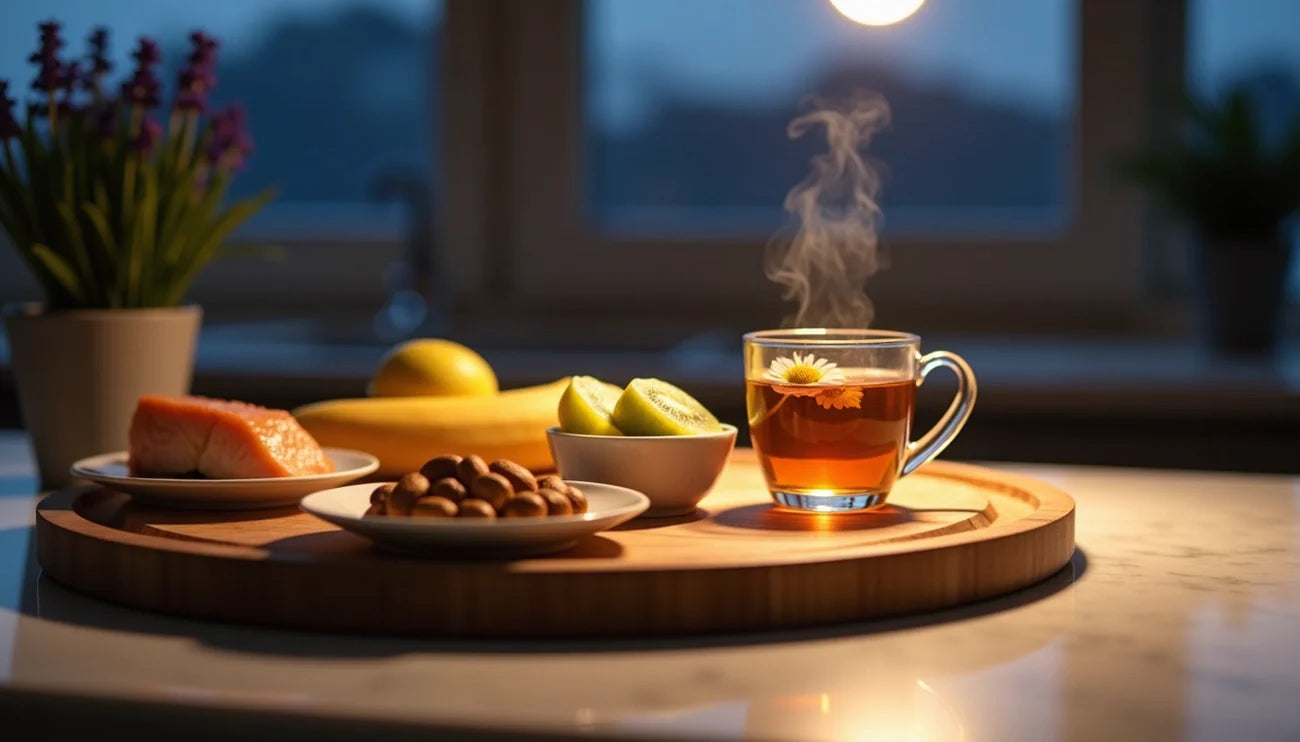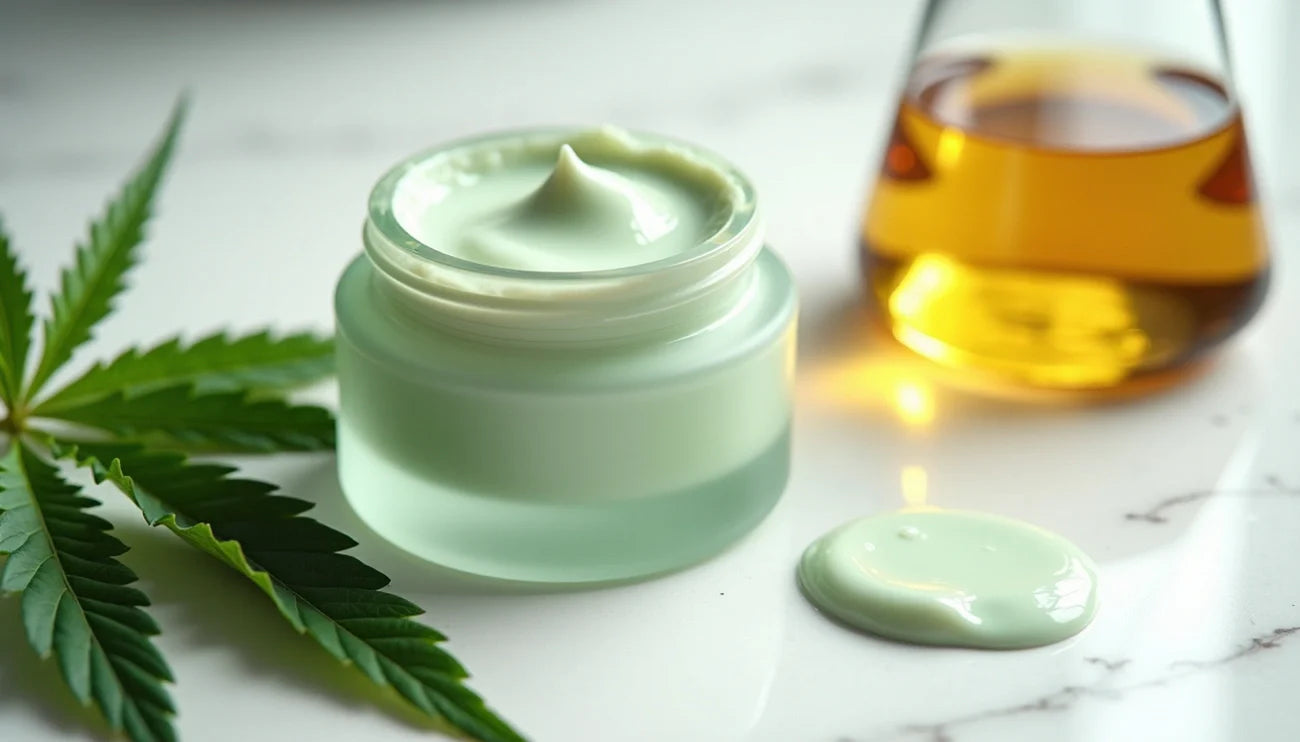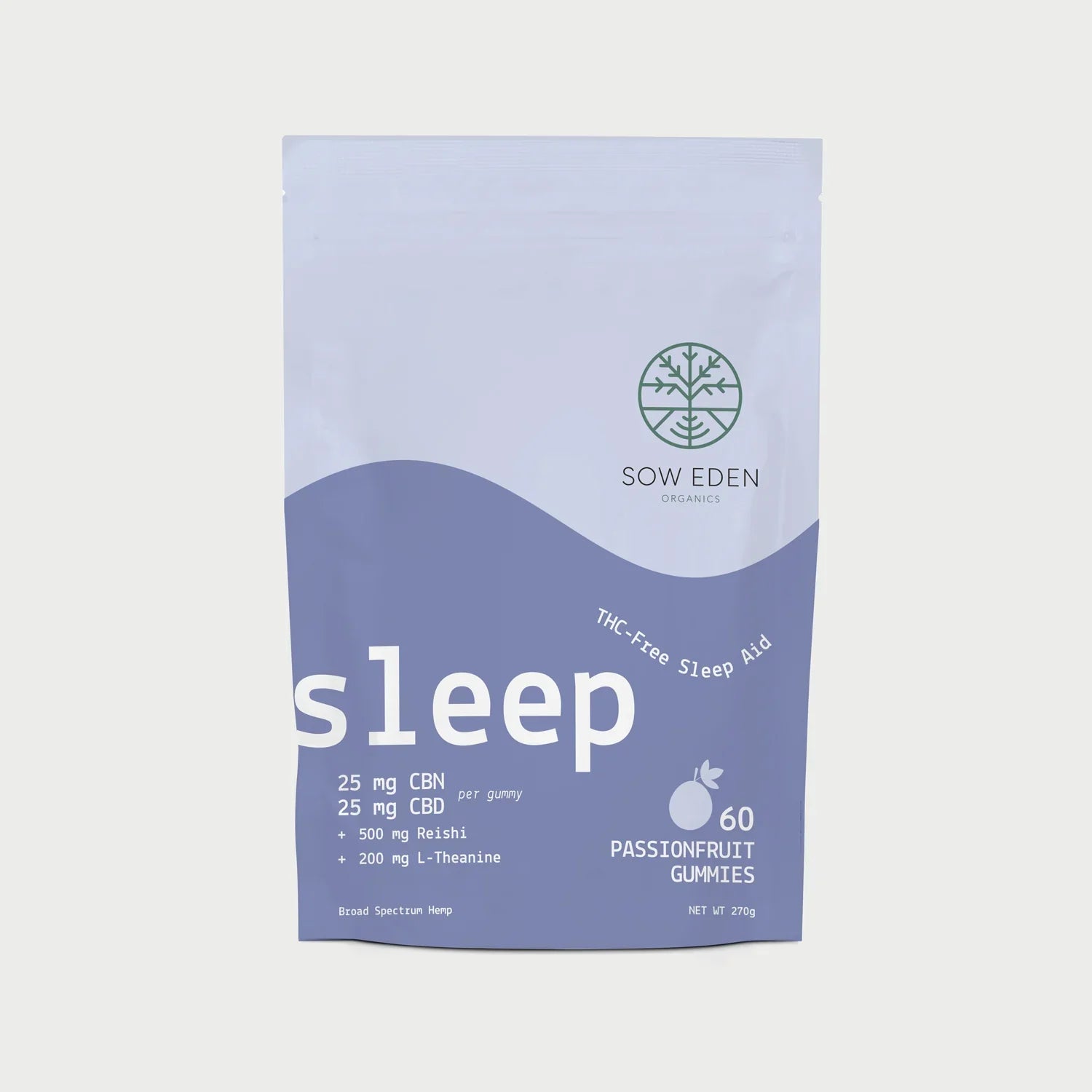Sleep-promoting foods might be just what you need for a better night's rest. The numbers are eye-opening - about 50-70 million adults in the United States deal with sleep disorders. Our research shows that our food choices really affect how well we sleep.
The science backs this up. Your sleep quality ties directly to what you eat. A diet packed with fiber but low in saturated fat and sugar helps you sleep better and wake up less during the night. Let us walk you through some natural sleep aids that work. Tart cherry juice contains natural melatonin, while turkey gives you a good dose of tryptophan. Some people also get good results from CBD gummies.
Good eating habits do more than just help you sleep better. They can protect you from chronic illnesses and give your immune system a boost. This piece will show you the best evening food habits to make your bedtime routine better. Your sleep quality suffers when you drink alcohol or make poor food choices. The right mix of nutrients makes all the difference for lasting sleep improvements.
Why your evening eating habits matter
Your evening meal schedule makes a big difference in your sleep quality. Most people think food choices matter most, but the timing of your meals affects your nightly rest just as much.
How late-night meals affect sleep
Your body runs on a natural internal clock called the circadian rhythm. Late-night eating tells your body to stay active, which makes it harder to relax. Research from Harvard Medical School shows that eating late affects our energy use, appetite, and fat tissue processes by a lot.
Your digestive system has to work extra hard when you eat late instead of resting. This increased activity sends more blood to your gut and raises your body temperature. These changes make you more alert and mess with your body's natural wind-down process.
A study revealed that people who ate within three hours of bedtime woke up more often (27.8%) than those who finished eating earlier (19.2%). These results held true even after researchers considered other factors.
More than that, big meals right before bed can make you uncomfortable in several ways:
- You might get acid reflux or heartburn while lying down
- Your blood sugar could spike and crash overnight
- Your metabolism stays active when it should slow down
Scientists have shown that eating at odd times confuses your body clock and disrupts sleep patterns. This becomes a real issue at night when your body should prepare for rest.
Timing your last meal for better rest
The right gap between dinner and bedtime helps you sleep better. Sleep experts suggest eating your last big meal 2-3 hours before bed. This timing lets your food digest properly while preventing midnight hunger pangs.
Cleveland Clinic explains that your body's insulin sensitivity changes throughout the day. Your morning insulin sensitivity helps power daily activities, but it decreases at night. Then, late-night calories turn into stored fat instead of fueling your day.
Early eaters who stay up late might benefit from a light, sleep-friendly snack. The secret lies in picking foods that help rather than hurt your rest:
- Foods rich in fiber help you spend more time in deep, restorative sleep - essential for memory and immune health
- Stay away from sugary foods before bed since they can make your sleep restless
- Avoid caffeine and alcohol because they can really mess with your sleep quality
Research shows that sleep and meal timing work both ways - poor sleep leads to bad eating habits, and bad eating habits disrupt sleep. You can break this cycle by sticking to regular meal times, which improves both your nutrition and sleep quality.
8 foods that promote better sleep
Need natural ways to sleep better? Some foods contain nutrients that help you drift off to dreamland easily. Science shows these eight foods have compounds that help you relax and regulate your sleep cycle.
1. Tart cherry juice
Tart cherry juice helps promote sleep because it contains high levels of melatonin—the hormone that regulates your sleep-wake cycle. Research proves that tart cherry juice substantially improves how long and well you sleep. People who drank tart cherry juice concentrate for 7 days had higher melatonin levels and slept better. You'll get the best results by drinking 8 ounces twice daily—once in the morning and once about an hour before bed. Most people notice improvements after 7-10 days if they keep taking them.
2. Almonds and walnuts
These nuts pack sleep-friendly compounds. Almonds give you magnesium and vitamin B that improve sleep quality. Walnuts rank among nature's best sources of melatonin. A newer study, published in by researchers found people who ate about ½ cup of walnuts daily for eight weeks fell asleep faster and slept 0.7% more efficiently. On top of that, it contains tryptophan (84.6 mg per serving) and melatonin (118 nanograms per serving).
3. Turkey and chicken
Turkey's reputation as a sleep aid comes from tryptophan—an essential amino acid that helps produce serotonin and melatonin. In stark comparison to this popular belief, turkey isn't unique in its tryptophan content. A roasted chicken leg provides 249% of your daily tryptophan needs. Both meats boost your serotonin and melatonin levels, helping regulate sleep and mood.
4. Kiwi
This tiny green fruit delivers impressive sleep benefits. Kiwis contain serotonin, melatonin, and folate—nutrients that support better sleep. Research shows eating two kiwis an hour before bedtime for four weeks increased total sleep time by 13.4% and improved sleep efficiency by 5.41%. People fell asleep 35.4% faster and spent 28.9% less time awake after dozing off.
5. Chamomile tea
Chamomile tea calms you down thanks to apigenin, an antioxidant that connects with specific brain receptors. This process reduces anxiety and helps you relax. Studies confirm that people who drink chamomile tea wake up less during sleep. Drink one cup about 30 minutes before bed and let it steep for at least five minutes to get the best results.
6. Oatmeal
Oatmeal's complex carbohydrates prevent blood sugar drops at night—unlike alcohol which disrupts sleep. It naturally contains melatonin and works even better with sleep-friendly toppings like bananas (rich in magnesium and potassium) and walnuts or pistachios (high in melatonin). This combination helps you fall asleep faster and stay asleep longer.
7. Fatty fish like salmon
Salmon and other fatty fish provide vitamin D and omega-3 fatty acids—nutrients that help control serotonin levels. A 3-ounce serving of sockeye salmon gives you 570 IU of vitamin D (71% of your daily value). Research suggests fatty fish might improve sleep quality by increasing vitamin D levels and potentially helping heart-rate regulation through omega-3s.
8. Bananas
Bananas contain sleep-promoting nutrients like magnesium, tryptophan, potassium, carbs, and vitamin B6. Magnesium helps maintain your normal circadian rhythm and may boost melatonin production. Your brain converts banana's tryptophan into serotonin, which then produces melatonin. The potassium prevents nighttime muscle cramps, while fiber keeps hunger at bay during sleep.
How to combine foods for maximum effect
Creating the perfect bedtime snack takes more than picking sleep-promoting ingredients. The real magic happens when you combine certain foods to improve their sleep-inducing properties.
Pairing tryptophan with carbs
The science of food combinations for better sleep centers around tryptophan—an essential amino acid your body uses to produce serotonin and melatonin. Your body can't produce tryptophan naturally, so you need to get it through diet.
Here's why this pairing works: Carbohydrates trigger your body to release insulin, which causes muscles to absorb most amino acids—all but one: tryptophan stays in your bloodstream. This boosts the ratio of tryptophan compared to other competing amino acids. More tryptophan crosses the blood-brain barrier and turns into sleep-promoting hormones.
Carbohydrates basically act as tryptophan's escort to your brain. All the same, this works best with easily digestible carbs like:
- Apples, bananas, or small cookies paired with turkey or chicken
- Oatmeal topped with almond butter or walnuts
- Whole grain toast with a small amount of cottage cheese
Research suggests you'd need an almost pure carbohydrate meal to substantially boost brain tryptophan levels. Yet even modest combinations can help you sleep better.
Balancing protein and fiber
Among the tryptophan-carb connection, the right balance between protein and fiber opens another path to better sleep. Most adults need about 0.8 grams of protein per kilogram of body weight (roughly 0.36 grams per pound).
The best approach combines moderate protein with fiber-rich foods. Fiber helps you sleep through several ways: it keeps blood sugar steady throughout the night, stops hunger from waking you up, and helps digestion work smoothly.
Your gut bacteria ferment dietary fibers and release more serotonin, which helps make melatonin. You should get 25-35 grams of fiber daily with plenty of water.
Research shows people who balance both protein and fiber enjoy more restorative sleep. They spend more time in slow-wave sleep—the deep, restorative phase.
Avoiding sugar and saturated fats
Understanding what to avoid matters as much as knowing good combinations. People who eat lots of sugar usually sleep fewer hours, wake up more often, and get lighter, less restful sleep.
Foods high in saturated fats take longer to digest and might cause stomach problems, cramps, or heartburn at bedtime. These uncomfortable feelings make falling and staying asleep harder.
The solution lies in swapping high-fat, sugary evening snacks with balanced mixtures of complex carbohydrates, lean proteins, and fiber. This creates the perfect foundation for quality sleep.
To cite an instance, see how greek yogurt with berries makes a better choice than ice cream before bed. It gives you protein, fiber, and tryptophan without too much sugar or fat.
Evening rituals that enhance food’s sleep benefits
The right foods combined with proper evening rituals can make a huge difference in how well you sleep. Your bedtime routine helps these sleep-friendly nutrients work better together, just like a conductor leads musicians.
Creating a calming bedtime routine
Your body needs consistent evening habits as signals to wind down. The natural melatonin production gets a boost when you dim the lights 1-2 hours before bed. You can add gentle stretching or reading to make the relaxing effects of cherries or almonds work even better.
Pro tip: Your bedroom should stay cool (around 65°F/18°C) and dark. These conditions help melatonin work at its best.
When to eat and when to stop
The timing makes a big difference. Sleep-promoting foods work best when you eat them 1-3 hours before bedtime. This gives enough time to digest and lets the nutrients kick in right when you need them.
People who get acid reflux should wait 3-4 hours after main meals. Light snacks are fine closer to bedtime.
Incorporating herbal teas and light snacks
Chamomile or valerian root tea works great with sleep-promoting foods. A small banana paired with chamomile tea about 45 minutes before bed is ideal - the tea's calming effects work well with potassium and magnesium.
A small portion of plain yogurt with honey can satisfy your sweet tooth without disrupting sleep.
Trying cbd gummies for sleep: what to know
CBD gummies are worth learning about as another option. These supplements might help reduce anxiety that keeps you awake. If you want to try cbd gummies for sleep, begin with a small dose (around 10-25mg) about 30-60 minutes before bed.
Make sure to ask your healthcare providers first since CBD can interact with some medications. Quality and ingredient accuracy matter, so look for products that have third-party testing.
Foods and habits to avoid before bed
Your food choices can improve or ruin your sleep. Good sleep requires knowing which foods to avoid before bed.
Caffeine and alcohol
Caffeine disrupts sleep and reduces how long you sleep. Studies show each cup of caffeinated drink cuts sleep time by 10.4 minutes. Average coffee drinkers lose more than an hour of sleep every week. You should stop consuming caffeine after 2 p.m. because it stays in your system for at least 12 hours.
Alcohol ruins your sleep quality despite making you drowsy at first. Each drink reduces sleep quality by about 4%. Your heart rate and blood pressure also increase during sleep because alcohol activates your sympathetic nervous system.
Spicy and acidic foods
Digestive discomfort from spicy and acidic foods can keep you awake at night. Foods like tomatoes, citrus fruits, and hot peppers trigger indigestion and make heartburn worse when you lie down. The acid travels up your esophagus and disturbs your sleep.
Heavy or high-fat meals
Your digestive system struggles with high-fat foods like fried items and fatty meats at night. This leads to bloating and acid reflux. Research shows eating more saturated fat results in lighter, less restful sleep. Your best option is to avoid these foods and choose the sleep-friendly alternatives mentioned earlier.
Final Thoughts
Sleep quality remains one of everything in our health that people often overlook. This piece explores how mutually beneficial food choices can substantially improve your sleep quality and duration. Natural medicine comes in the form of food that helps us rest better.
Your food choices and sleep patterns work hand in hand. Bad sleep pushes you toward unhealthy food choices, while good nutrition supports better rest. The simple strategies above help break this cycle.
Food timing matters as much as selection. Your last big meal should be 2-3 hours before bed to help digestion and prevent midnight cravings. Sleep-promoting foods like tart cherry juice, kiwis, and fatty fish give your body nutrients that regulate your sleep-wake cycle.
Smart food combinations boost these benefits. Complex carbs paired with tryptophan-rich foods help this amino acid cross the blood-brain barrier better. Your blood sugar stays stable through the night when you balance protein with fiber.
Evening routines work perfectly with these nutrition strategies. Your body responds to consistent bedtime habits as signals to wind down. The right bedroom temperature helps melatonin work better. These habits combined with smart food choices create your best sleep environment.
You should know what foods to avoid. Caffeine, alcohol, spicy foods, and heavy meals mess with your sleep patterns, whatever your tiredness level. These items fight against the benefits of a careful sleep diet.
Sleep problems affect millions of Americans each day. Many people miss the strong link between diet and rest. Simple changes to your evening eating habits can improve sleep without pills. The right foods might give you the deep, restorative rest your body needs.




